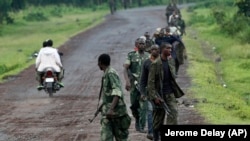The Rwandan government is disputing findings in a leaked United Nations report that says the country’s military joined with the rebel M23 group to attack security forces in the neighboring Democratic Republic of Congo (DRC).
A spokesperson for the government of Rwanda, Yolanda Makolo, responded on Twitter, calling it a “tactical distraction.” Based on allegations revealed in the report, that is not the case.
On August 4, multiple news outlets carried stories saying a U.N. panel had fund “solid evidence” that Rwandan forces fought alongside M23 rebels. Said France’s LeMonde:
“The confidential report by the United Nations group of experts on the Democratic Republic of the Congo (DRC), transmitted to member states of the U.N. Security Council … accused the Rwandan army of having participated in attacks against Congolese soldiers and supplying reinforcements to the insurgents of the 23-March Movement (M23). This rebellion, born in 2012, took up arms against the state in late 2021 in eastern DRC, along the border with Rwanda.
“The U.N. experts, who conducted ‘on-site inspections’ and analyzed ‘available images,’ claimed to have ‘solid evidence’ of Rwandan military involvement in several attacks on Congolese soldiers in North Kivu province, the stronghold of the M23, between November 2021 and July 2022.”
M23 is responsible for an insurgency in the eastern DRC that the U.N. has characterized as a “serious threat to peace, security, and stability in the region,” causing massive displacement of civilians and widespread violence.
M23 was all but defeated in 2013, but the group recently reconstituted, launching several attacks this spring on government bases and civilians. In late June, VOA reported that a “resurgent” M23 was attempting to capture cities in the eastern DRC’s North and South Kivu and Ituri provinces.
U.S. Secretary of State Antony Blinken addressed the violence in the region during visits to Kinshasa and Kigali this week. According to The New York Times, Blinken called for an end to violence by all parties and cited “credible reports” of Rwandan support for M23:
“ ‘Whoever it’s by, whoever it’s to, that support has to cease,’ Mr. Blinken said at a news conference in Kigali, the capital of Rwanda. ‘It’s a matter of principle that applies equally. It’s not a matter of weighing one group against another.’
“American and Rwandan officials estimate that more than 130 armed groups are operating in eastern Congo, which has become a battleground for militias who have maimed and murdered while profiting from the billions of dollars of minerals smuggled out of the resource-rich region. Many of the groups get weapons and financial support from the Congolese government or from other African nations.”
M23 has been accused of widespread human rights abuses, including the targeting civilians and sexual violence. Last month, a Human Rights Watch (HRW) report blamed M23 for 29 deaths since mid-June. In a summary online, HRW said:
“Witnesses told Human Rights Watch that on June 21, following fighting around the village of Ruvumu, M23 rebels summarily killed at least 17 civilians, including 2 teenagers, whom they accused of informing the Congolese army about their positions and hideouts. Some were shot dead as they attempted to flee, while others were executed at close range.
“Deliberate killings of civilians are serious violations of international humanitarian law, including Common Article 3 to the 1949 Geneva Conventions, and are war crimes.”
HRW noted that M23 disputed the allegations, blaming other armed groups operating in the region. The report noted, however, that on June 14, "the United States embassy in Congo said it was, ‘extremely concerned about the recent fighting in eastern [Congo] and the reported presence of Rwandan forces on [Congo]’s territory.’ ”
U.N. experts in June also reported the “presence of individuals wearing uniforms of the Rwanda Defence Force (RDF) in M23 camps located in [Congo], [had been] confirmed by aerial footage and photographic evidence,” HRW said.
Successive Rwandan governments have denied cross-border activities. In May, Makolo told the New Times, a Rwandan news outlet, that Rwanda “has no intention of being drawn into” fighting in the Congo.
Blinken and Rwandan Foreign Minister Vincent Biruta held a news conference in Kigali on August 11, at which Biruta said Rwanda’s security concern is with ethnic Hutu fighters and “terrorist” violence. “Rwanda is not the cause of longstanding instability in eastern DRC,” Biruta said.
In the Rwandan genocide of 1994, majority Hutus killed an estimated 800,000 Tutsis, an ethnic minority, and moderate Hutus. After his news conference, Blinken visited a memorial where the remains of 250,000 Rwandans killed in the holocaust are buried.
